Cecil Mills Collection - Wallet 7 - Part 1 of 2
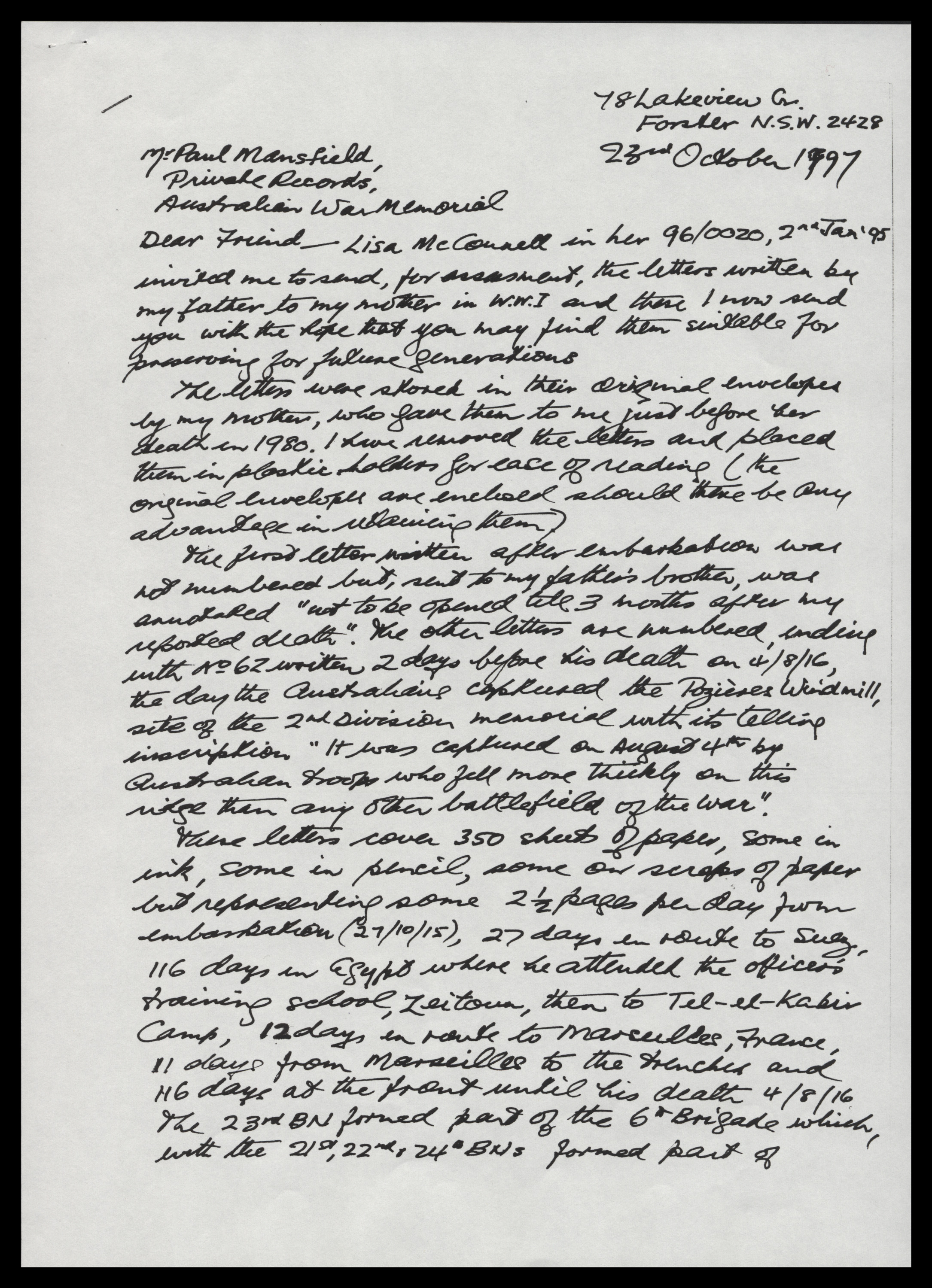
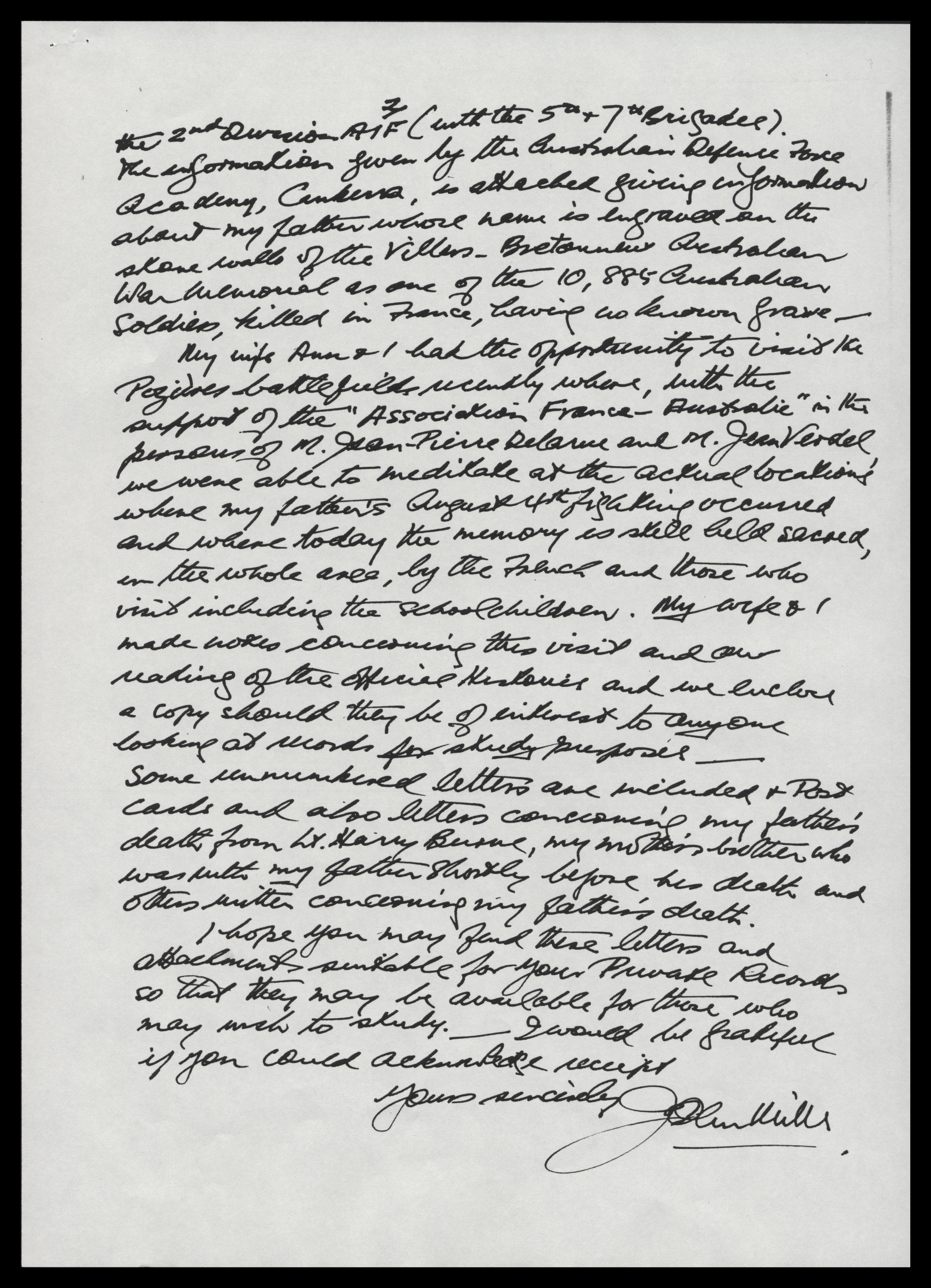


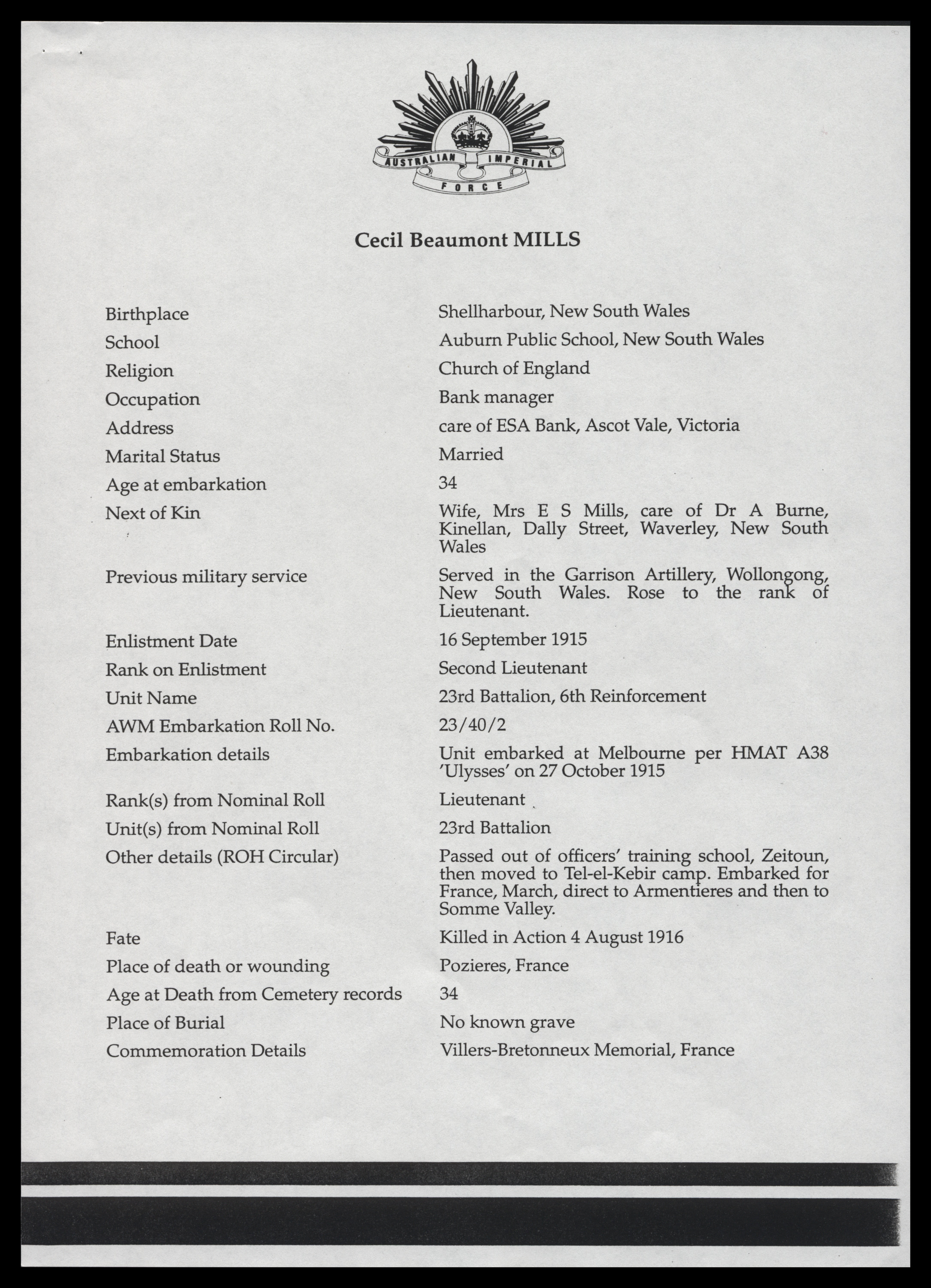
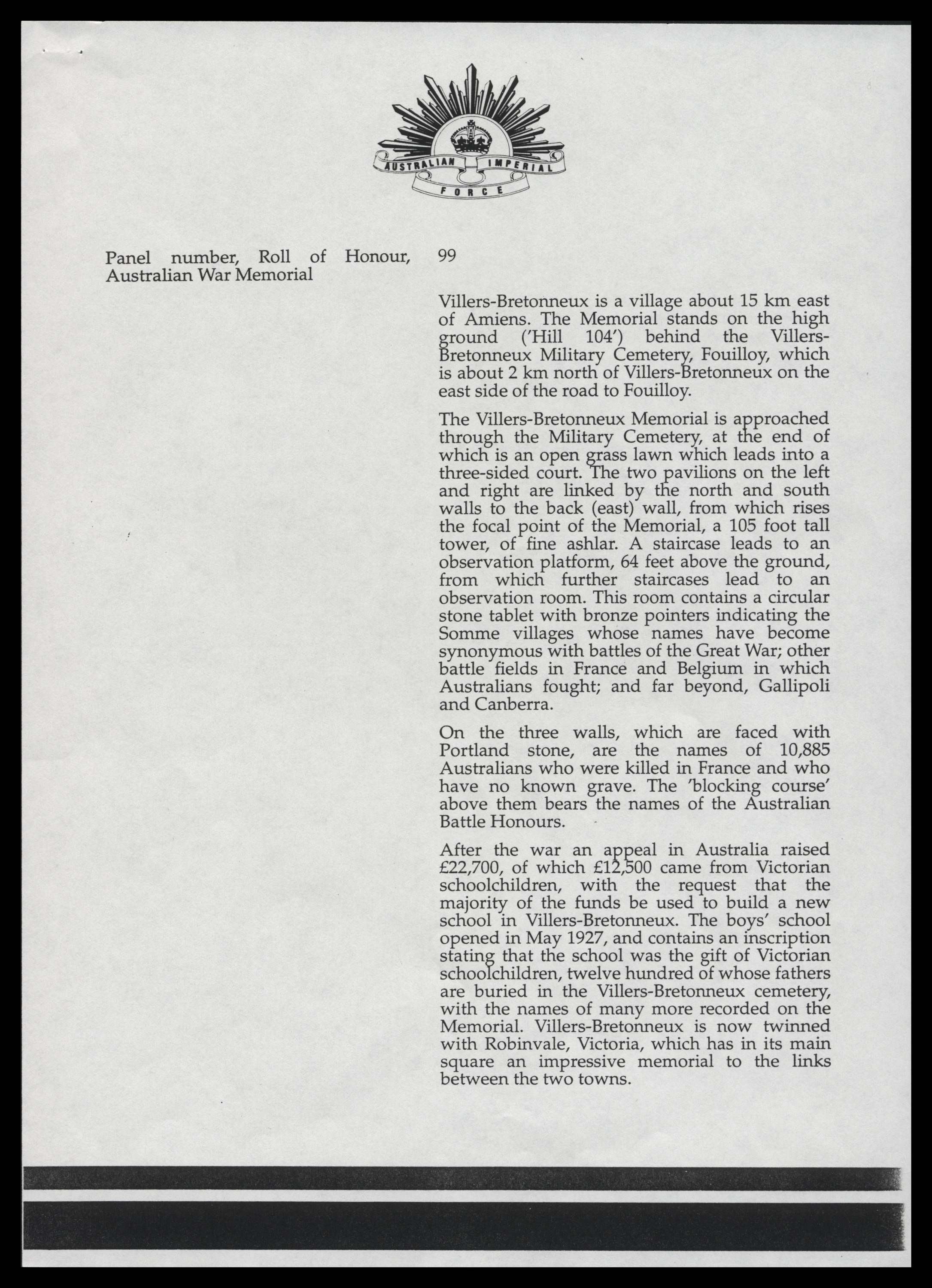

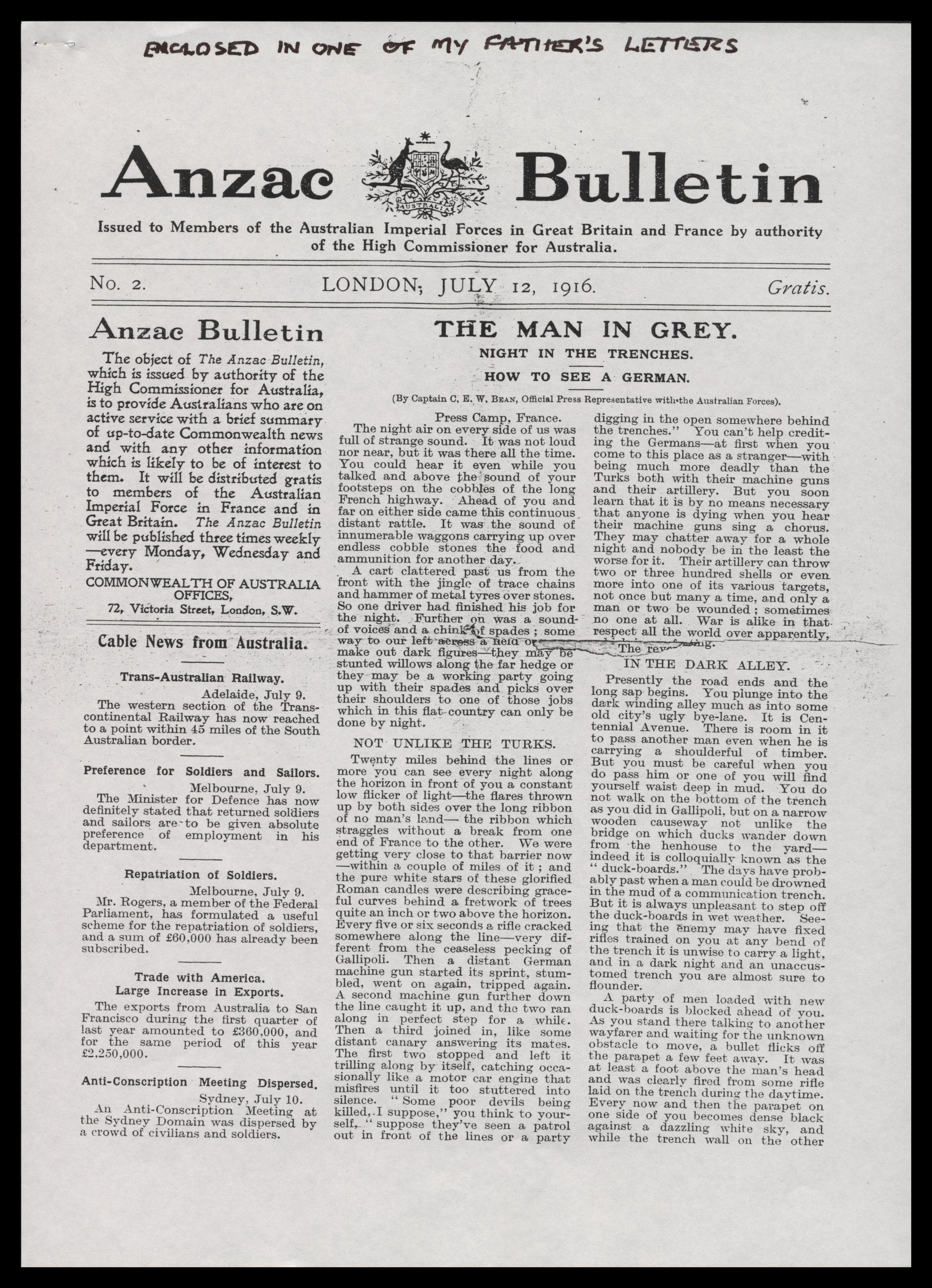
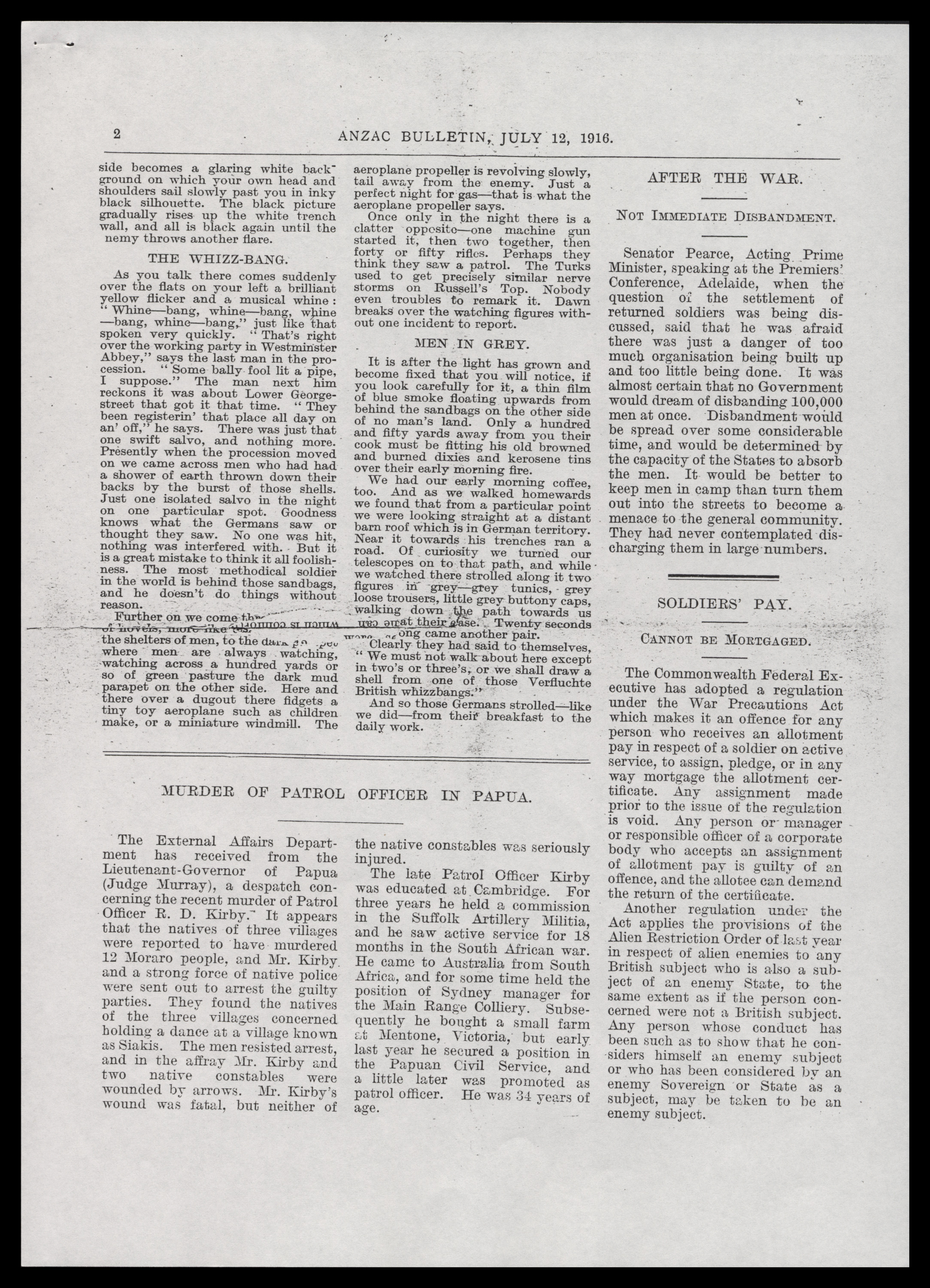
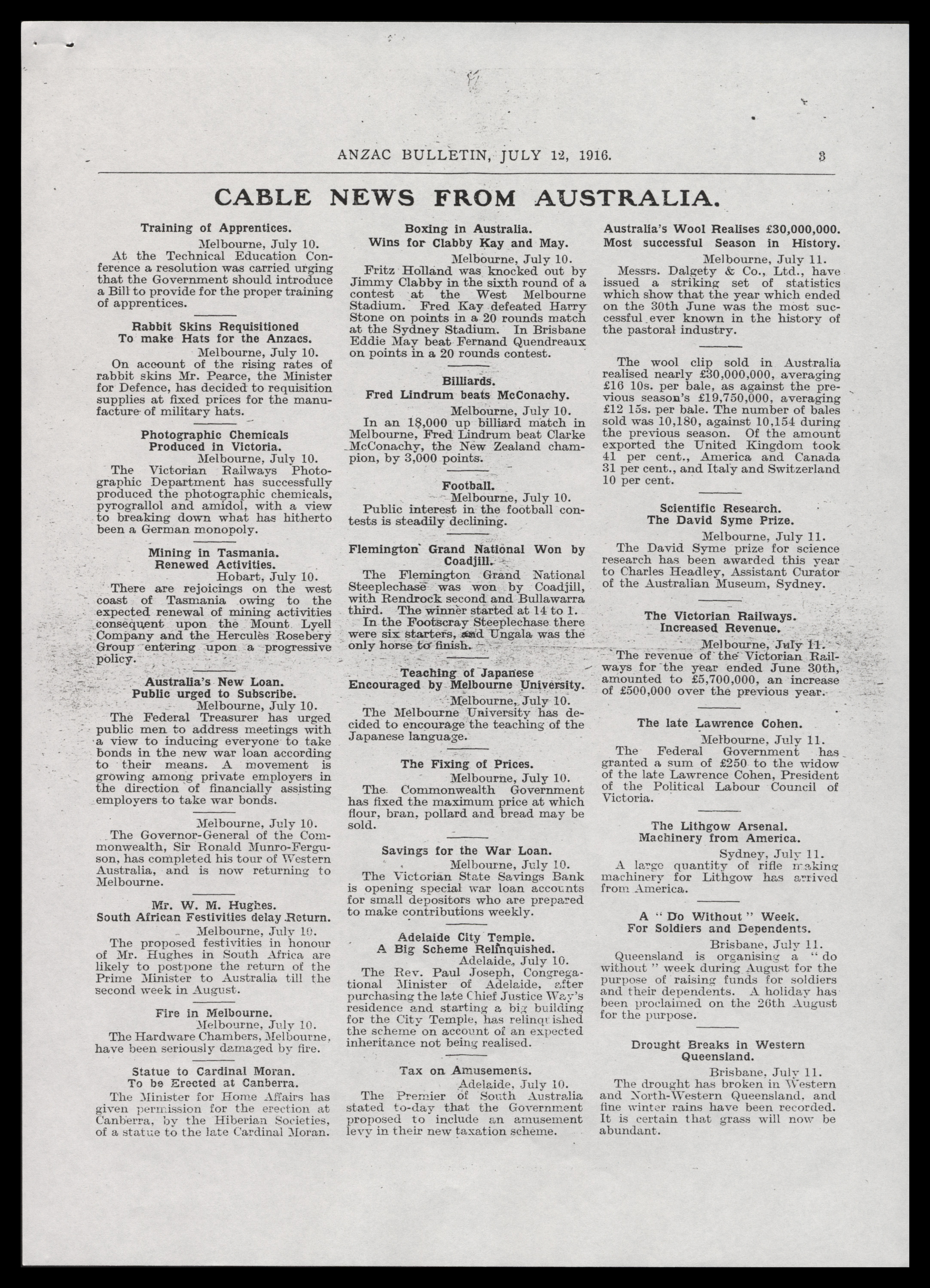
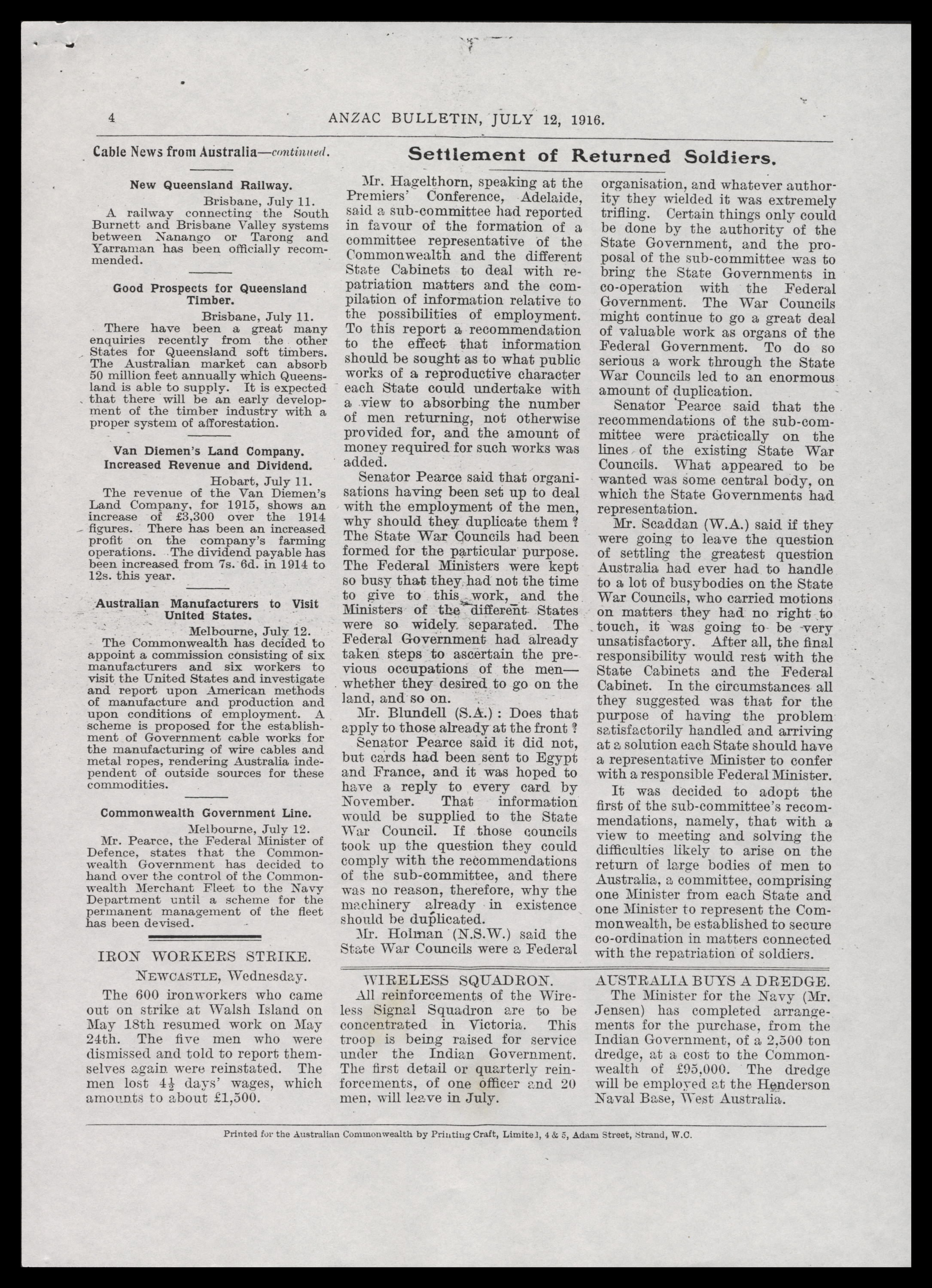
78 Lakeview Cr.
Forster N.S.W. 2428
23rd October 1997
Mr Paul Mansfield,
Private Records,
Australian War Memorial
Dear Friend - Lisa McConnell in her 96/0020, 2nd Jan '95
invited me to send, for assessment, the letters written by
my father to my mother in W.W.I and these I now send
you with the hope that you may find them suitable for
preserving for future generations
The letters were stored in their original envelopes
by my mother, who gave them to me just before her
death in 1980. I have removed the letters and placed
them in plastic holders for ease of reading (the
original envelopes are enclosed should there be any
advantage utilising them).
The first letter written after embarkation was
not numbered but, sent to my father's brother, was
annotated "not to be opened till 3 months after my
reported death". The other letters are numbered, ending
with No. 62 written 2 days before his death on 4/8/16,
the day the Australians captured Pozieres Windmill,
site of the 2nd Division memorial with its telling
inscription "It was captured on August 4th by
Australian troops who fell more thickly on this
ridge than any other battlefield of the war."
These letters cover 350 sheets of paper, some in
ink, some in pencil, some on scraps of paper
but representing some 2 1/2 pages per day from
embarkation (27/10/15), 27 days en route to Suez,
116 days in Egypt where he attended the officers'
training school, Zeitoun, then to Tel-el-Kabir
Camp, 12 days en route to Marseilles, France,
11 days from Marseilles to the trenches and
116 days at the front until his death 4/8/16.
The 23rd BN formed part of the 6th Brigade which,
with the 21st, 22nd & 24th BNs formed part of
2/
the 2nd Division AIF (with the 5th & 7th Brigades).
The information given by the Australian Defence Force
Academy, Canberra, is attached giving information
about my father whose name is engraved on the
stone walls of the Villers-Bretonneux Australian
War Memorial as one of the 10,885 Australian
Soldiers, killed in France, having unknown grave.
My wife Ann & I had the opportunity to visit the
Pozieres battlefields recently where, with the
support of the "Association France - Australie" in the
persons of M. Jean-Pierre Delarue and M. Jean Verdel
we were all able to meditate at the actual locations
where my father's August 4th fighting occurred
and where today the memory is still held sacred,
in the whole area, by the French and those who
visit including the school children. My wife & I
made notes concerning this visit and our
reading of the official Histories and we enclose
a copy should they be of interest to anyone
looking at records for study purposes. -
Some unnumbered letters are included & Post
cards and also letters concerning my father's
death from Lt. Harry Burne, my mother's brother who
was with my father shortly before his death and
others written concerning my father's death.
I hope you may find the letters and
attachments suitable for your Private Records
so that they may be available for those who
may wish to study. - I would be grateful
if you could acknowledge receipt.
Yours Sincerely
John Mills
University College
Australian Defence Force Academy
Canberra Australia
SCIENTIA
TO LEAD TO EXCEL
The University of New South Wales
Cecil Beaumont MILLS
enlisted on
16 September 1915
in the
23rd Battalion, 6th Reinforcement
Australian Imperial Force
with the rank of
Second Lieutenant
and was listed as
Killed in Action
on
4 August 1916
Cecil Beaumont MILLS
| Birthplace | Shellharbour, New South Wales |
| School | Auburn Public School, New South Wales |
| Religion | Church of England |
| Occupation | Bank manager |
| Address | care of ESA Bank, Ascot Vale, Victoria |
| Marital Status | Married |
| Age at embarkation | 34 |
| Next of Kin | Wife, Mrs E S Mills, care of Dr A Burne, Kinellan, Dally Street, Waverley, New South Wales |
| Previous military service | Served in the Garrison Artillery, Wollongong, New South Wales. Rose to the rank of Lieutenant. |
| Enlistment Date | 16 September 1915 |
| Rank on Enlistment | Second Lieutenant |
| Unit Name | 23rd Battalion, 6th Reinforcement |
| AWM Embarkation Roll No. | 23/40/2 |
| Embarkation details | Unit embarked at Melbourne per HMAT A38 'Ulysses’ on 27 October 1915 |
| Rank(s) from Nominal Roll | Lieutenant |
| Unit(s) from Nominal Roll | 23rd Battalion |
| Other details (ROH Circular) | Passed out of officers' training school, Zeitoun, then moved to Tel-el-Kebir camp. Embarked for France, March, direct to Armentieres and then to Somme Valley. |
| Fate | Killed in Action 4 August 1916 |
| Place of death or wounding | Pozieres, France |
| Age at Death from Cemetery records | 34 |
| Place of Burial | No known grave |
| Commemoration Details | Villers-Bretonneux Memorial, France |
| Panel number, Roll of Honour, Australian War Memorial |
99 |
| Villers-Bretonneux is a village about 15 km east of Amiens. The Memorial stands on the high ground ('Hill 104’) behind the Villers- Bretonneux Military Cemetery, Fouilloy, which is about 2 km north of Villers-Bretonneux on the east side of the road to Fouilloy. The Villers-Bretonneux Memorial is approached through the Military Cemetery, at the end of which is an open grass lawn which leads into a three-sided court. The two pavilions on the left and right are linked by the north and south walls to the back (east) wall, from which rises the focal point of the Memorial, a 105 foot tall tower, of fine ashlar. A staircase leads to an observation platform, 64 feet above the ground, from which further staircases lead to an observation room. This room contains a circular stone tablet with bronze pointers indicating the Somme villages whose names have become synonymous with battles of the Great War; other battle fields in France and Belgium in which Australians fought; and far beyond, Gallipoli and Canberra. On the three walls, which are faced with Portland stone, are the names of 10,885 Australians who were killed in France and who have no known grave. The ’blocking course' above them bears the names of the Australian Battle Honours. After the war an appeal in Australia raised £22,700, of which £12,500 came from Victorian schoolchildren, with the request that the majority of the funds be used to build a new school in Villers-Bretonneux. The boys' school opened in May 1927, and contains an inscription stating that the school was the gift of Victorian schoolchildren, twelve hundred of whose fathers are buried in the Villers-Bretonneux cemetery, with the names of many more recorded on the Memorial. Villers-Bretonneux is now twinned with Robinvale, Victoria, which has in its main square an impressive memorial to the links between the two towns. |
| Miscellaneous information from Cemetery records |
Parents: John Beaumont and Esther MILLS |
| Other details | War service: Egypt, Western Front Medals: British War Medal, Victory Medal |
ENCLOSED IN ONE OF MY FATHERS'S LETTERS
Anzac Bulletin
Issued to Members of the Australian Imperial Forces in Great Britain and France by authority
of the High Commissioner for Australia.
No. 2. LONDON, JULY 12, 1916. Gratis.
Anzac Bulletin
The object of The Anzac Bulletin,
which is issued by authority of the
High Commissioner for Australia,
is to provide Australians who are on
active service with a brief summary
of up-to-date Commonwealth news
and with any other information
which is likely to be of interest to
them. It will be distributed gratis
to members of the Australian
Imperial Force in France and in
Great Britain. The Anzac Bulletin
will be published three times weekly
—every Monday, Wednesday and
Friday.
COMMONWEALTH OF AUSTRALIA
OFFICES,
72, Victoria Street, London, S.W.
Cable News from Australia.
Trans-Australian Railway.
Adelaide, July 9.
The western section of the Trans-
continental Railway has now reached
to a point within 45 miles of the South
Australian border.
Preference for Soldiers and Sailors.
Melbourne, July 9.
The Minister for Defence has now
definitely stated that returned soldiers
and sailors are to be given absolute
preference of employment in his
department.
Repatriation of Soldiers.
Melbourne, July 9.
Mr. Rogers, a member of the Federal
Parliament, has formulated a useful
scheme for the repatriation of soldiers,
and a sum of £60,000 has already been
subscribed.
Trade with America.
Large Increase in Exports.
The exports from Australia to San
Francisco during the first quarter of
last year amounted to £360,000, and
for the same period of this year
£2,250,000.
Anti-Conscription Meeting Dispersed
Sydney, July 10.
An Anti-Conscription Meeting at
the Sydney Domain was dispersed by
a crowd of civilians and soldiers.
THE MAN IN GREY.
NIGHT IN THE TRENCHES.
HOW TO SEE A GERMAN.
(By Captain C, E. W. BEAN, Official Press Representative with the Australian Forces).
Press Camp, France.
The night air on every side of us was
full of strange sound. It was not loud
nor near, but it was there all the time.
You could hear it even while you
talked and above the sound of vour
footsteps on the cobbles of the long
French highway. Ahead of you and
far on either side came this continuous
distant rattle. It was the sound of
innumerable waggons carrying up over
endless cobble stones the food and
ammunition for another day.
A cart clattered past us from the
front with the jingle of trace chains
and hammer of metal tyres over stones.
So one driver had finished his job for
the night. Further on was a sound
of voices and a chink of spades
way to our left across a field o[[?]]
make out dark figures—they may be
stunted willows along the far hedge or
they may be a working party going
up with their spades and picks over
their shoulders to one of those jobs
which in this flat-country can only be
done by night.
NOT UNLIKE THE TURKS.
Twenty miles behind the lines or
more you can see every night along
the horizon in front of you a constant
low flicker of light—the flares thrown
up by both sides over the long ribbon
of no man’s land— the ribbon which
straggles without a break from one
end of France to the other. We were
getting very close to that barrier now
—within a couple of miles of it; and
the pure white stars of these glorified
Roman candles were describing graceful
curves behind a fretwork of trees
quite an inch or two above the horizon.
Every five or six seconds a rifle cracked
somewhere along the line—very different
from the ceaseless pecking of
Gallipoli. Then a distant German
machine gun started its sprint, stumbled,
went on again, tripped again.
A second machine gun further down
the line caught it up, and the two ran
along in perfect step for a while.
Then a third joined in, like some
distant canary answering its mates.
The first two stopped and left it
trilling along by itself, catching occasionally
like a motor car engine that
misfires until it too stuttered into
silence. "Some poor devils being
killed, I suppose," you think to yourself,
“suppose they’ve seen a patrol
out in front of the lines or a party
digging in the open somewhere behind
the trenches." You can’t help crediting
the Germans—at first when you
come to this place as a stranger—with
being much more deadly than the
Turks both with their machine guns
and their artillery. But you soon
learn that it is by no means necessary
that anyone is dying when you hear
their machine guns sing a chorus.
They may chatter away for a whole
night and nobody be in the least the
worse for it. Their artillery can throw
two or three hundred shells or even
more into one of its various targets,
not once but many a time, and only a
man or two be wounded ; sometimes
no one at all. War is alike in that
respect all the world over apparently,
[[?]]
IN THE DARK ALLEY.
Presently the road ends and the
long sap begins. You plunge into the
winding alley much as into some
old city’s ugly bye-lane. It is Centennial
Avenue. There is room in it
to pass another man even when he is
carrying a shoulderful of timber.
But you must be careful when you
do pass him or one of you will find
yourself waist deep in mud. You do
not walk on the bottom of the trench
as you did in Gallipoli, but on a narrow
wooden causeway not unlike the
bridge on which ducks wander down
from the henhouse to the yard—
indeed it is colloquially known as the
“duck-boards. The days have probably
past when a man could be drowned
in the mud of a communication trench
But it is always unpleasant to step of
the duck-boards in wet weather. Seeing
that the enemy may have fixed
rifles trained on you at any bend of
the trench it is unwise to carry a light
and in a dark night and an unaccustomed
trench you are almost sure to
flounder.
A party of men loaded with new
duck-boards is blocked ahead of you.
As you stand there talking to another
wayfarer and waiting for the unknown
obstacle to move, a bullet flicks off
the parapet a few feet away. It was
at least a foot above the man’s head
and was clearly fired from some rifle
laid on the trench during the daytime.
Every now and then the parapet on
one side of you becomes dense black
against a dazzling white sky, and
while the trench wall on the other
2 ANZAC BULLETIN, JULY 12, 1916.
side becomes a glaring white back
ground on which your own head and
shoulders sail slowly past you in inky
black silhouette. The black picture
gradually rises up the white trench
wall, and all is black again until the
enemy throws another flare.
THE WHIZZ-BANG.
As you talk there comes suddenly
over the flats on your left a brilliant
yellow flicker and a musical whine:
"Whine—bang, whine—bang, whine
—bang, whine—bang," just like that
spoken very quickly. "That's right
over the working party in Westminster
Abbey,” says the last man in the procession.
"Some bally fool lit a pipe,
I suppose.” The man next him
reckons it was about Lower George–
street that got it that time. "They
been registerin' that place all day on
an' off,” he says. There was just that
one swift salvo, and nothing more.
Presently when the procession moved
on we came across men who had had
a shower of earth thrown down their
backs by the burst of those shells.
Just one isolated salvo in the night
on one particular spot. Goodness
knows what the Germans saw or
thought they saw. No one was hit
nothing was interfered with. But it
is a great mistake to think it all foolishness.
The most methodical soldier
in the world is behind those sandbags,
and he doesn’t do things without
reason.
Further on we come th [[?]]
of hovels, more like this.
the shelters of men, to the dar [[?]]
where men are always watching,
watching across a hundred yards or
so of green pasture the dark mud
parapet on the other side. Here and
there over a dugout there fidgets a
tiny toy aeroplane such as children
make, or a miniature windmill. The
aeroplane propeller is revolving slowly,
tail away from the enemy. Just a
perfect night for gas—that is what the
aeroplane propeller says.
Once only in the night there is a
clatter opposite—one machine gun
started it, then two together, then
forty or fifty rifles. Perhaps they
think they saw a patrol. The Turks
used to get precisely similar nerve
storms on Russell’s Top. Nobody
even troubles to remark it. Dawn
breaks over the watching figures without
one incident to report.
MEN IN GREY.
It is after the light has grown and
become fixed that you will notice, if
you look carefully for it, a thin film
of blue smoke floating upwards from
behind the sandbags on the other side
of no man’s land. Only a hundred
and fifty yards away from you their
cook must be fitting his old browned
and burned dixies and kerosene tins
over their early morning fire.
We had our early morning coffee,
too. And as we walked homewards
we found that from a particular point
we were looking straight at a distant
barn roof which is in German territory.
Near it towards his trenches ran a
road. Of curiosity we turned our
telescopes on to that path, and while
we watched there strolled along it two
figures in grey—grey tunics, grey
loose trousers, little grey buttony caps,
walking down the path towards us
[[?]] ase. Twenty seconds
[[?]] along came another pair.
Clearly they had said to themselves,
“ We must not walk about here except
in two’s or three’s, or we shall draw a
shell from one of those Verfluchte
British whizzbangs."
And so those Germans strolled—like
we did—from their breakfast to the
daily work.
MURDER OF PATROL OFFICER IN PAPUA.
The External Affairs Department
has received from the
Lieutenant-Governor of Papua
(Judge Murray), a despatch concerning
the recent murder of Patrol
Officer R. D. Kirby. It appears
that the natives of three villages
were reported to have murdered
12 Moraro people, and Mr. Kirby
and a strong force of native police
were sent out to arrest the guilty
parties. They found the natives
of the three villages concerned
holding a dance at a village known
as Siakis. The men resisted arrest
and in the affray Mr. Kirby and
two native constables were
wounded by arrows. Mr. Kirby’s
wound was fatal, but neither of
the native constables was seriously
injured.
The late Patrol Officer Kirby
was educated at Cambridge. For
three years he held a commission
in the Suffolk Artillery Militia,
and he saw active service for 18
months in the South African war.
He came to Australia from South
Africa, and for some time held the
position of Sydney manager for
the Main Range Colliery. Subsequently
he bought a small farm
at Mentone, Victoria, but early
last year he secured a position in
the Papuan Civil Service, and
a little later was promoted as
patrol officer. He was 34 years of
age.
AFTER THE WAR.
NOT IMMEDIATE DISBANDMENT.
Senator Pearce, Acting Prime
Minister, speaking at the Premiers'
Conference, Adelaide, when the
question of the settlement of
returned soldiers was being discussed,
said that he was afraid
there was just a danger of too
much organisation being built up
and too little being done. It was
almost certain that no Government
would dream of disbanding 100,000
men at once. Disbandment would
be spread over some considerable
time, and would be determined by
the capacity of the States to absorb
the men. It would be better to
keep men in camp than turn them
out into the streets to become a
menace to the general community.
They had never contemplated discharging
them in large numbers.
SOLDIERS' PAY.
CANNOT BE MORTGAGED.
The Commonwealth Federal Ex¬
ecutive has adopted a regulation
under the War Precautions Act
which makes it an offence for any
person who receives an allotment
pay in respect of a soldier on active
service, to assign, pledge, or in any
way mortgage the allotment certificate.
Any assignment made
prior to the issue of the regulation
is void. Any person or manager
or responsible officer of a corporate
body who accepts an assignment
of allotment pay is guilty of an
offence, and the allotee can demand
the return of the certificate.
Another regulation under the
Act applies the provisions of the
Alien Restriction Order of last year
in respect of alien enemies to any
British subject who is also a subject
of an enemy State, to the
same extent as if the person concerned
were not a British subject.
Any person whose conduct has
been such as to show that he considers
himself an enemy subject
or who has been considered by an
enemy Sovereign or State as a
subject, may be taken to be an
enemy subject.
ANZAC BULLETIN, JULY 12, 1916 3
CABLE NEWS FROM AUSTRALIA.
Training of Apprentices.
Melbourne, July 10.
At the Technical Education Conference
a resolution was carried urging
that the Government should introduce
a Bill to provide for the proper training
of apprentices.
Rabbit Skins Requisitioned
To make Hats for the Anzacs.
Melbourne, July 10.
On account of the rising rates of
rabbit skins Mr. Pearce, the Minister
for Defence, has decided to requisition
supplies at fixed prices for the manufacture
of military hats.
Photographic Chemicals
Produced in Victoria.
Melbourne, July 10.
The Victorian Railways Photographic
Department has successfully
produced the photographic chemicals,
pyrograllol and amidol, with a view
to breaking down what has hitherto
been a German monopoly.
Mining in Tasmania.
Renewed Activities.
Hobart, July 10.
There are rejoicings on the west
coast of Tasmania owing to the
expected renewal of mining activities
consequent upon the Mount Lyell
Company and the Herculès Rosebery
Group entering upon a progressive
policy.
Australia’s New Loan.
Public urged to Subscribe.
Melbourne, July 10
The Federal Treasurer has urged
public men to address meetings with
a view to inducing everyone to take
bonds in the new war loan according
to their means. A movement is
growing among private employers in
the direction of financially assisting
employers to take war bonds.
Melbourne, July 10.
The Governor-General of the Commonwealth,
Sir Ronald Munro-Ferguson,
has completed his tour of Western
Australia, and is now returning to
Melbourne.
Mr. W. M. Hughes.
South African Festivities delay Return.
Melbourne, July 10.
The proposed festivities in honour
of Mr. Hughes in South Africa are
likely to postpone the return of the
Prime Minister to Australia till the
second week in August.
Fire in Melbourne.
Melbourne, July 10.
The Hardware Chambers, Melbourne
have been seriously damaged by fire.
Statue to Cardinal Moran.
To be Erected at Canberra.
The Minister for Home Affairs has
given permission for the erection at
Canberra, by the Hiberian Societies,
of a statue to the late Cardinal Moran.
Boxing in Australia
Wins for Clabby Kay and May.
Melbourne, July 10.
Fritz Holland was knocked out by
Jimmy Clabby in the sixth round of a
contest at the West Melbourne
Stadium. Fred Kay defeated Harry
Stone on points in a 20 rounds match
at the Sydney Stadium. In Brisbane
Eddie May beat Fernand Quendreaux
on points in a 20 rounds contest.
Billiards.
Fred Lindrum beats McConachy.
Melbourne, July 10
In an 18,000 up billiard match in
Melbourne, Fred Lindrum beat Clarke
McConachy, the New Zealand champion,
by 3,000 points.
Football.
Melbourne, July 10.
Public interest in the football contests
is steadily declining.
Flemington Grand National Won by
Coadjill.
The Flemington Grand National
Steeplechase was won by Coadjill
with Rendrock second and Bullawarra
third. The winnèr started at 14 to 1.
In the Footscray Steeplechase there
were six starters, and Ungala was the
only horse to finish.
Teaching of Japanese
Encouraged by Melbourne University.
Melbourne, July 10.
The Melbourne University has decided
to encourage the teaching of the
Japanese language.
The Fixing of Prices.
Melbourne, July 10.
The Commonwealth Government
has fixed the maximum price at which
flour, bran, pollard and bread may be
sold.
Savings for the War Loan.
Melbourne, July 10.
The Victorian State Savings Bank
is opening special war loan accounts
for small depositors who are prepared
to make contributions weekly.
Adelaide City Temple
A Big Scheme Relinquished.
Adelaide, July 10.
The Rev. Paul Joseph, Congregational
Minister of Adelaide, after
purchasing the late Chief Justice Way's
residence and starting a big building
for the City Temple, has relinquished
the scheme on account of an expected
inheritance not being realised.
Tax on Amusements.
Adelaide, July 10.
The Premier of South Australia
stated to-day that the Government
proposed to include an amusement
levy in their new taxation scheme.
Australia’s Wool Realises £30,000,000.
Most successful Season in History.
Melbourne, July 11.
Messrs. Dalgety & Co., Ltd., have
issued a striking set of statistics
which show that the year which ended
on the 30th June was the most successful
ever known in the history of
the pastoral industry.
The wool clip sold in Australia
realised nearly £30,000,000, averaging
£16 10s. per bale, as against the previous
season’s £19,750,000, averaging
£12 15s. per bale. The number of bales
sold was 10,180, against 10,154 during
the previous season. Of the amount
exported the United Kingdom took
41 per cent., America and Canada
31 per cent., and Italy and Switzerland
10 per cent.
Scientific Research.
The David Syme Prize.
Melbourne, July 11.
The David Syme prize for science
earch has been awarded this year
to Charles Headley, Assistant Curator
of the Australian Museum, Sydney.
The Victorian Railways.
Increased Revenue.
Melbourne, July 11.
The revenue of the Victorian Railways
for the year ended June 30th,
amounted to £5,700,000, an increase
of £500,000 over the previous year.
The late Lawrence Cohen.
Melbourne, July 11.
The Federal Government has
granted a sum of £250 to the widow
of the late Lawrence Cohen, President
of the Political Labour Council of
Victoria.
The Lithgow Arsenal.
Machinery from America.
Sydney, July 11.
A large quantity of rifle making
machinery for Lithgow has arrived
from America.
A “ Do Without ” Week.
For Soldiers and Dependents.
Adelaide City Temple.
Brisbane, July 1
Queensland is organising a "do
without” week during August for the
purpose of raising funds for soldiers
and their dependents. A holiday has
been proclaimed on the 26th August
for the purpose.
Drought Breaks in Western
Queensland.
Brisbane, July 11.
The drought has broken in Western
and North-Western Queensland, and
fine winter rains have been recorded.
It is certain that grass will now be
abundant.
4 ANZAC BULLETIN, JULY 12, 1916.
Cable News from Australia—continued.
New Queensland Railway.
Brisbane, July 11
A railway connecting the South
Burnett and Brisbane Valley systems
between Nanango or Tarong and
Yarraman has been officially recommended.
Good Prospects for Queensland
Timber.
Brisbane, July 11.
There have been a great many
enquiries recently from the other
States for Queensland soft timbers.
The Australian market can absorb
50 million feet annually which Queensland
is able to supply. It is expected
that there will be an early development
of the timber industry with a
proper system of afforestation.
Van Diemen’s Land Company.
Increased Revenue and Dividend.
Hobart, July 11
The revenue of the Van Diemen's
Land Company, for 1915, shows an
increase of £3,300 over the 1914
figures. There has been an increased
profit on the company’s farming
operations. The dividend payable has
been increased from 7s. 6d. in 1914 to
12s. this year.
Australian Manufacturers to Visit
United States.
Melbourne, July 12.
The Commonwealth has decided to
appoint a commission consisting of six
manufacturers and six workers to
visit the United States and investigate
and report upon American methods
of manufacture and production and
upon conditions of employment. A
scheme is proposed for the establishment
of Government cable works for
the manufacturing of wire cables and
metal ropes, rendering Australia independent
of outside sources for these
commodities.
Commonwealth Government Line.
Melbourne, July 12.
Mr. Pearce, the Federal Minister of
Defence, states that the Commonwealth
Government has decided to
hand over the control of the Commonwealth
Merchant Fleet to the Navy
Department until a scheme for
permanent management of the fleet
has been devised.
IRON WORKERS STRIKE.
NEWCASTLE, Wednesday
The 600 ironworkers who came
out on strike at Walsh Island on
May 18th resumed work on May
24th. The five men who were
dismissed and told to report them-
selves again were reinstated. The
men lost 4½ days' wages, which
amounts to about £1,500.
Settlement of Returned Soldiers.
Mr. Hagelthorn, speaking at the
Premiers’ Conference, Adelaide
said a sub-committee had reported
in favour of the formation of a
committee representative of the
Commonwealth and the different
State Cabinets to deal with repatriation
matters and the compilation
of information relative to
the possibilities of employment.
To this report a recommendation
to the effect that information
should be sought as to what public
works of a reproductive character
each State could undertake with
a view to absorbing the number
of men returning, not otherwise
provided for, and the amount of
money required for such works was
added.
Senator Pearce said that organisations
having been set up to deal
with the employment of the men–
why should they duplicate them?
The State War Councils had been
formed for the particular purpose.
The Federal Ministers were kept
so busy that they had not the time
to give to this work, and the
Ministers of the different States
were so widely separated. The
Federal Government had already
taken steps to ascertain the previous
occupations of the men—
whether they desired to go on the
land, and so on.
Mr. Blundell (S.A.): Does that
apply to those already at the front ?
Senator Pearce said it did not,
but cards had been sent to Egypt
and France, and it was hoped to
have a reply to every card by
November. That information
would be supplied to the State
War Council. If those councils
took up the question they could
comply with the recommendation
of the sub-committee, and there
was no reason, therefore, why the
machinery already in existence
should be duplicated.
Mr. Holman (N.S.W.) said the
State War Councils were a Federal
organisation, and whatever authority
they wielded it was extremely
trifling. Certain things only could
be done by the authority of the
State Government, and the proposal
of the sub-committee was to
bring the State Governments in
co-operation with the Federal
Government. The War Councils
might continue to go a great deal
of valuable work as organs of the
Federal Government. To do so
serious a work through the State
War Councils led to an enormous
amount of duplication.
Senator Pearce said that the
recommendations of the sub-committee
were practically on the
lines of the existing State War
Councils. What appeared to be
wanted was some central body, on
which the State Governments had
representation.
Mr. Scaddan (W.A.) said if they
were going to leave the question
of settling the greatest question
Australia had ever had to handle
to a lot of busybodies on the State
War Councils, who carried motions
on matters they had no right to touch,
it was going to be very
unsatisfactory. After all, the final
responsibility would rest with the
State Cabinets and the Federal
Cabinet. In the circumstances all
they suggested was that for the
purpose of having the problem
satisfactorily handled and arriving
at a solution each State should have
a representative Minister to confer
with a responsible Federal Minister.
It was decided to adopt the
first of the sub-committee’s recommendations,
namely, that with a
view to meeting and solving the
difficulties likely to arise on the
return of large bodies of men to
Australia, a committee, comprising
one Minister from each State and
one Minister to represent the Commonwealth,
be established to secure
co-ordination in matters connected
with the repatriation of soldiers.
WIRELESS SQUADRON
All reinforcements of the Wireless
Signal Squadron are to be
concentrated in Victoria. This
troop is being raised for service
under the Indian Government.
The first detail or quarterly reinforcements,
of one officer and 20
men, will leave in July.
AUSTRALIA BUYS A DREDGE.
The Minister for the Navy (Mr.
Jensen) has completed arrangements
for the purchase, from the
Indian Government, of a 2,500 ton
dredge, at a cost to the Commonwealth
of £95,000. The dredge
will be employed at the Henderson
Naval Base, West Australia.
Printed for the Australian Commonwealth by Printing Craft, Limite 1, 4 & 5, Adam Street, Strand, W.C.
 Jacqueline Kennedy
Jacqueline KennedyThis transcription item is now locked to you for editing. To release the lock either Save your changes or Cancel.
This lock will be automatically released after 60 minutes of inactivity.